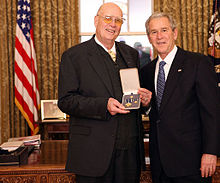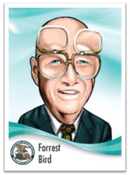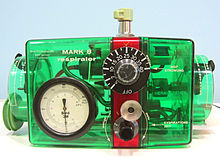Biography
Bird was born in Stoughton, Massachusetts. Bird became a pilot at an early age with his father's encouragement. By age 14, he flew his first solo fight.
By age 16 he was working to obtain multiple major pilot certifications.
Bird enlisted with the United States Army Air Corps, and entered active duty in 1941 as a technical air training officer due to his advanced qualifications. This rank, combined with the onset of World War II, gave him the opportunity to pilot almost every aircraft in service, including early jet aircraft and helicopters.
The newest models of aircraft were capable of exceeding altitudes at which humans can breathe, even with 100% oxygen supplementation, introducing the risk of hypoxia. Bird discovered an oxygen regulator in a crashed German bomber he was ferrying to the U.S. for study seemed to contain a pressure breathing circuit. He took the oxygen regulator home, studied it, and made it more functional. It became the standard design for high-altitude oxygen regulators for most military aircraft until recent time. Bird studied medicine " ... to understand the human body and its stress in flight". This led to him developing efficient respirators and ventilators.
In 1967, Bird developed the Bird Innovator, a conversion of the Consolidated PBY Catalina amphibian aircraft, the aircraft being based at Palm Springs until 1976. His company was Bird Oxygen Breathing Equipment Inc, later renamed Bird Corporation.
Bird resided in Sagle, Idaho, close to the Canada–US border which is where his home, production facilities, museum and ranch were located. Bird collected and restored old planes, old cars, and motorcycles.
Forrest and Pamela Bird opened the Bird Aviation Museum and Invention Center in July 2007, with aviator Patty Wagstaff cutting a ceremonial ribbon at the end of the runway while flying. The Bird's are the founders and owners of the museum, which showcases Bird's various aircraft and inventions.
On December 10, 2008, Bird received the Presidential Citizens Medal from President George Bush. The United States honored him for his groundbreaking contributions and for his work to keep America at the forefront of discovery. On October 7, 2009, President Barack Obama awarded Bird the National Medal of Technology and Innovation, a recognition of his "outstanding contributions to the promotion of technology for the improvement of the economic, environmental or social well-being of the United States."
Bird died at the age of 94 of natural causes at his Sagle, Idaho home on August 2, 2015.


